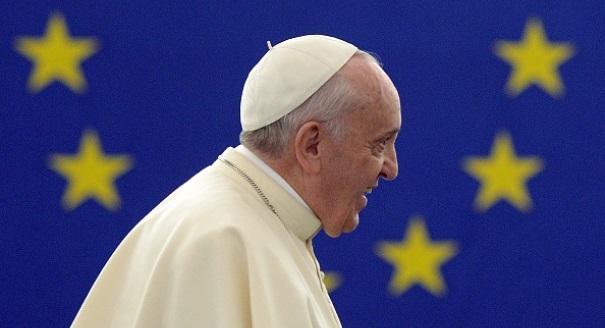For all his criticism of the EU, Pope Francis was a big hit at the European Parliament in Strasbourg. There, on November 25, he spoke his mind about a Europe that was losing its place in the world, running roughshod over its values, and shifting its moral and political compass.
“Despite a larger and stronger Union, Europe seems to give the impression of being somewhat elderly and haggard, feeling less and less a protagonist in a world which frequently regards it with aloofness, mistrust and even, at times, suspicion,” the pope said.
Old is something that Europeans are becoming at such a pace that many countries are in desperate need of a young and educated workforce to finance the ever-aging population. But Europe doesn’t yet have an enlightened policy toward immigration. If anything, there is a dangerous backlash against immigrants, with the UK leading the way.
French economist Jean Monnet and French statesman Robert Schuman had the immense foresight to rebuild postwar Europe around the European Coal and Steel Community (a precursor to the EU). While the community fostered the reconciliation of France and West Germany, it also paved the way for integrating Europe in a way that brought it an extraordinary period of peace, stability, and prosperity.
Immigrants and refugees played a role in Europe’s economic recovery. Indeed, a part of Europe’s identity was about being open to both. In more recent years, recall how Germany, among other EU countries, took in tens of thousands of refugees during the Yugoslav Wars of the 1990s.
That was two decades ago.
Since then, despite the enlargement of the EU, European countries have failed to come up with a fair and united policy over refugees, as Pope Francis pointed out in Strasbourg. Some countries, particularly Italy and Greece, are the first port of call for those taking the risk to sail across the Mediterranean in makeshift boats and so often at the hands of traffickers.
The unwelcoming reception that both countries give refugees is well documented. If possible, many migrants try to move to another EU country. But it’s not as simple as that. Under the Dublin Regulation, the member state through which an asylum seeker first enters the EU is responsible for examining the asylum application.
The law has put huge pressure on Italy and Greece. Understandably, they want a reform of the regulation so that all EU countries would share the burden.
Pandering to parties that identify with #Putin's illiberal policies is despicable.Tweet This
Yet several European leaders are loath to open their doors to refugees and immigrants (but not those with deep pockets). Governments worry that doing so would strengthen far-right and far-left parties.
From Britain’s UK Independence Party (UKIP) to Hungary’s Jobbik, these parties despise immigrants who come from other EU countries and, worse, from outside the union. Pandering to these parties, which identify with Russian President Vladimir Putin’s illiberal policies, is despicable.
Pope Francis did not pull his punches about Europe’s attitude toward refugees. “We cannot allow the Mediterranean to become a vast cemetery!” he told European parliamentarians.
“The boats landing daily on the shores of Europe are filled with men and women who need acceptance and assistance. The absence of mutual support within the European Union runs the risk of encouraging particularistic solutions to the problem, solutions which fail to take into account the human dignity of immigrants, and thus contribute to slave labour and continuing social tensions.”
We cannot allow the Mediterranean to become a vast cemetery, @Pontifex told @Europarl_EN.Tweet This
It’s a pity the pope didn’t have a pie chart showing the distribution of Syria’s 3.1 million refugees. Turkey has taken in 1.1 million, Lebanon 1.1 million, Jordan 619,000, Iraq 225,000, and Egypt 139,000. Some of these countries have been forced to close their borders because they cannot cope with ever-increasing numbers fleeing the war in Syria and the conflicts in Iraq and Libya. Those figures aside, there are also 6.5 million internally displaced people in Syria.
As for European countries opening their doors to refugees, António Guterres, the UN high commissioner for refugees, is disgusted with their reaction. “In response to the largest forced displacement crisis in the world, taking place only a short boat ride away, Europeans have provided refuge to a grand total of 124,000 Syrians – less than 4% of all Syrian asylum seekers,” Guterres wrote recently.
Germany, by the way, has accepted the majority of those refugees, defying nasty neo-Nazi demonstrations against immigrants, especially Muslims.
Despite repeated requests by the UN refugee agency and human rights organizations, most European governments don’t seem prepared to be more flexible in accepting refugees—let alone in reforming EU asylum legislation. One wonders whether the response would be different if tens of thousands of refugees were forced to flee to EU countries from Ukraine.






